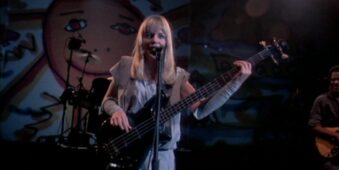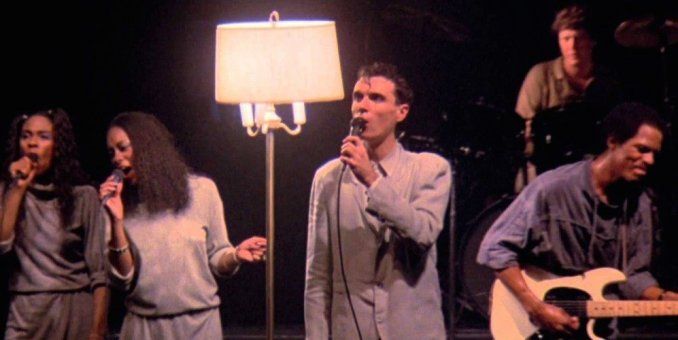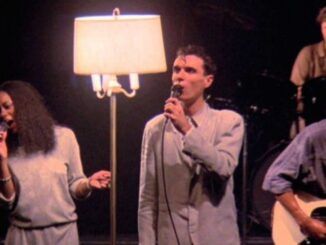
On December 13, 1983, the members of the band Talking Heads took to the stage at Hollywood’s Pantages Theater, stepping into both music and film history. Over the course of three nights, director Jonathan Demme captured the band’s performances in what has been hailed as at the time the greatest concert film ever made – Stop Making Sense. Forty years later, thanks to a new restoration of the film that premiered at the Toronto International Film Festival last week – which it and the question and answer session with the band following the screening were broadcast to IMAX theaters around the world – the film still retains that crown.
The new 4K restoration of Stop Making Sense has a limited, one-week engagement at select IMAX theaters starting this Friday, September 22, followed by a general theaters release on Friday, September 29.
Now I should note that I have been a Talking Heads fan since high school. “Burning Down The House” have been playing on radio, but it was through a friend Who got me to listen to the soundtrack album to the concert film that really birthed my fandom of the band. By the time I graduated, I had all of their albums released to that point, a number of 12″ singles and unreleased B-sides, two books that had already been published about the band, and a couple of bootleg albums of live recordings from earlier tours. So yes, I may be a little biased here.
But while in all those years since high school I never had an opportunity to see Stop Making Sense theatrically, I have watched the film numerous times in both VHS and then DVD format. (It was one of the two VHS tapes I rented the first weekend after my family got our first video cassette player and I must have watched and rewatched the film four or five times in that three day period.) So for those whose only experience with the film is the home video release of Stop Making Sense, the 4K restoration done for the film here from the original camera negatives is a visual revelation. Details pop that were formerly lost in the lower resolution of those home video releases. Who knew that David Byrne’s jacket worn in the early part of the concert was actually a light blue-gray sucker and not the gray broadcloth as it had previously appeared on VHS and DVD? This restoration is like seeing the film for the 1st time all over again.

For the uninitiated, the concert film opens on a stage, bare except for a lone microphone stand. Talking Heads frontman David Byrne enters from the wings, an acoustic guitar slung over one shoulder and carrying a boom box, which he sets down next to mic. Hitting the play button to start a pre-recorded drum track, Byrne launches into a solo version of the band’s breakout song “Psycho Killer.” Then slowly over the course of the next several songs, Byrne is joined by the rest of the core band – bassist Tina Weymouth, drummer Chris Frantz and guitarist/keyboardist Jerry Harrison – one member at the start of each subsequent song. The rest of the band’s touring musicians – keyboardist Bernie Worrell, percussionist Steve Scales, guitarist Alex Weir and backup singers Ednah Holt and Lynn Mabry – follow.
By the time the group launches into Talking Heads’ biggest hit, “Burning Down The House,” at the film’s twenty minute mark, the show has gone from the existential angst of solo Byrne to a full-out gospel-and-afro-rhythm-tinged dance party that stays that way for the next hour or so as Demmee’s cameras darting in and out, often capturing the joy on the musicians’ faces. The overall result is definitely the most cinematic concert film since Michael Wadleigh’s Woodstock, and one that has probably not been equaled since. The 4K restoration may betray moments when the camera slips out of focus but that somehow just contributes to the visual energy and overall celebratory vibe of the film.
Byrne crafted the stage show for the concert tour captured in the film to have something of an arc as it slowly introduced the band to the audience. “It seemed like it had kind of a progression to it, a story,” he stated in the question and answer session with the band at last week’s screening. And it was that arc that sparked the idea for a concert film. “It occurred to us this could maybe work as a film [because it had] a beginning and a middle and an end.”
Demme also saw that cinematic potential, and his approach to filming the concert further expounded on that idea, as Byrne discovered when he visited the director and film editor Lisa Day at work editing the film.

“I realized that he was looking at it like it was an ensemble film,” Byrne said. “Like, you have a group of actors in one place, and you get to know each character one by one. It was like Jonathan was letting you get to know them, get to be familiar with them as they all came together and interacted with each other. It blew my mind. I thought, ‘Well, I’m in my own world up there — but he saw it.’ He saw what was going on up there!”
“And I think because he did that you can see that we are having so much fun onstage,” added Harrison. “The audience feels that connection. And I think that’s why the film feels timeless.”
“Talking Heads was such a good band,” added Frantz. “And when we had that expanded lineup with Steve Scales and Bernie Worrell and Lynn Mabry and Ednah Holt and Alex Weir, they just took us into a whole other dimension. I’m very grateful to be here tonight and to be able to watch this and to enjoy it so much.”
And while fans may lament about the shows filmed for Stop Making Sense are among the last handful that of live performances that the band ever played, in part due to a feeling of not knowing how to top the artistry of the last tour and partly due to the cracks that were already forming in the relationship between band members, we do have this astounding document of what those groundbreaking performances looked like.
Same as it ever was.




